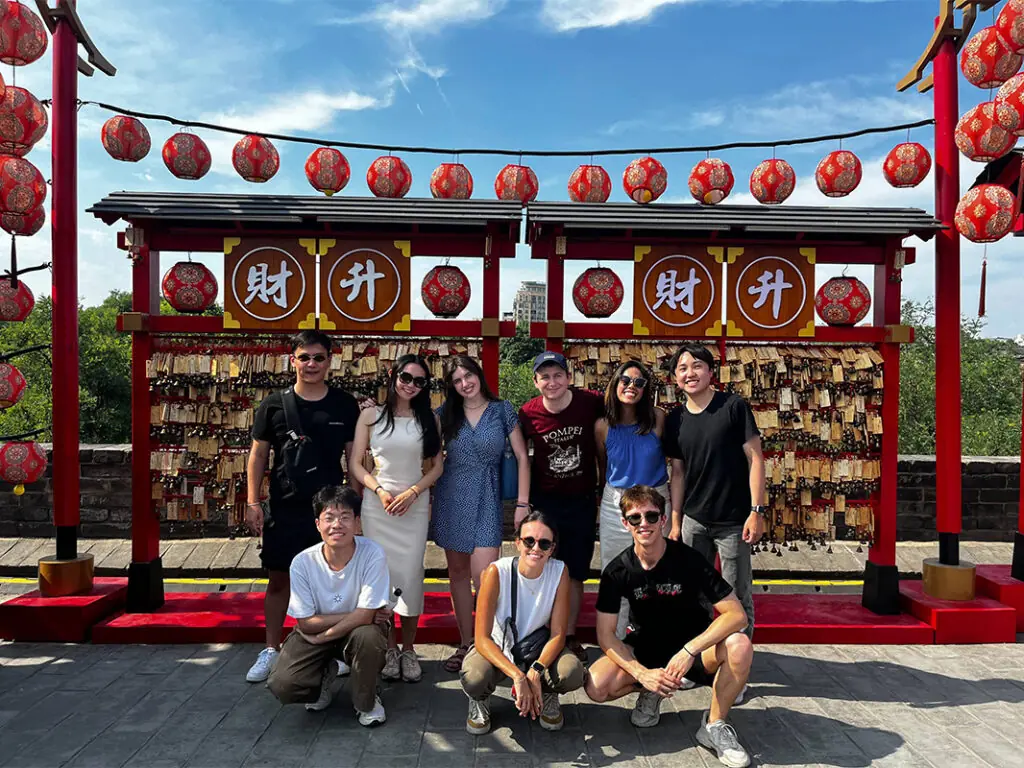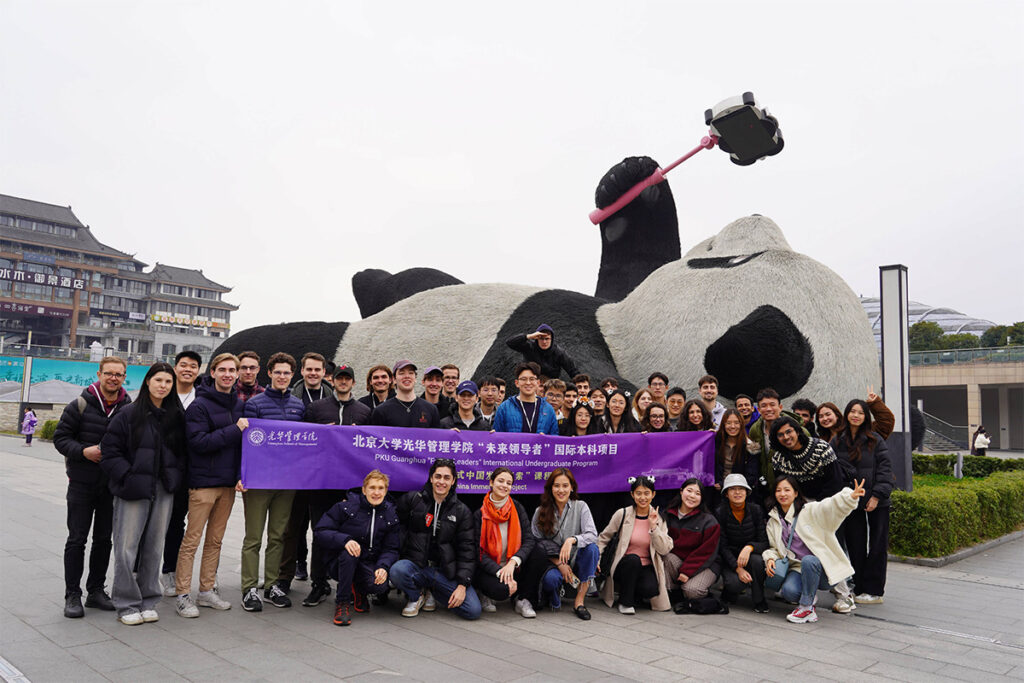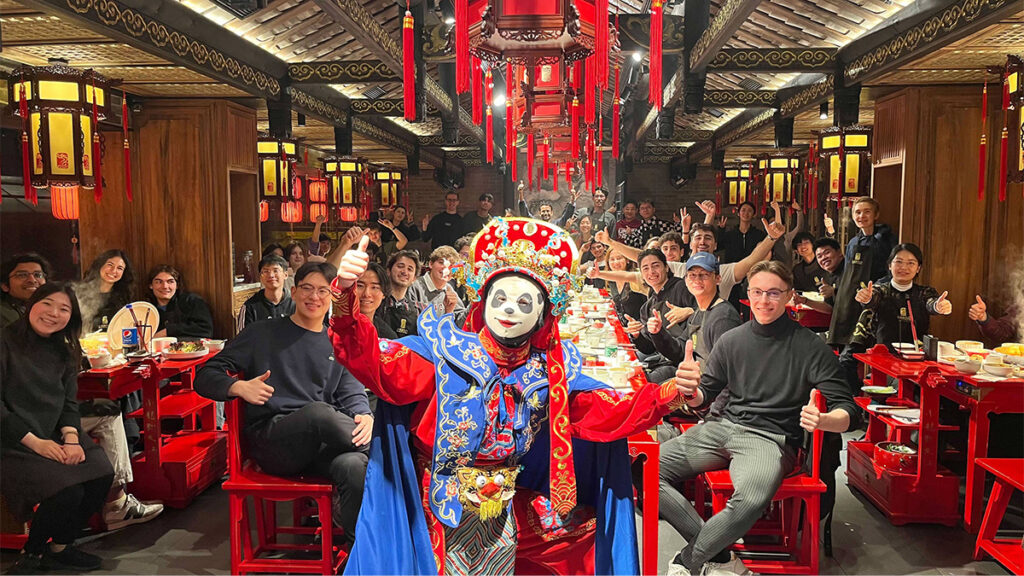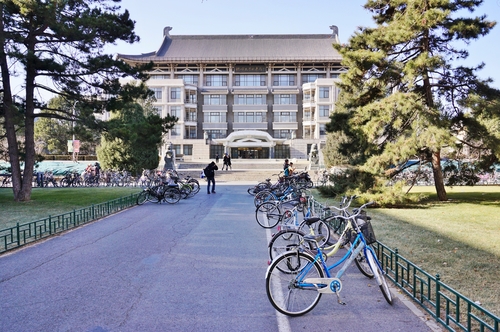
Since 2020, IE Business School has been a partner of the Guanghua School of Management at Peking University’s Future Leaders International Undergraduate Dual Degree Program.
Bachelor in Business Administration students complete the final two years of their degree at Guanghua, living in Beijing with selected participants from prestigious business schools in 13 countries and regions, and local Chinese students. They graduate with degrees from both IE Business School and Peking University, one of the top universities in Asia.
The program has recently welcomed its sixth cohort, and we sat down with past and current Future Leaders Vincent Hug de Merlo, Angela Manero, Alicia Chen and Trym Ekra-Reistad to learn more about why they joined, what their experience was like and its lasting impact.
Why apply? Prestige, perspective and personal roots
A mix of factors drew our students to the program. “I was intrigued by the prestige, how they would only select up to five applicants per business school. I wanted to be among those bright students from around the world,” said Vincent.
Others had more personal reasons for participating. “It was a great opportunity to understand where my family comes from,” said Alicia. Angela, whose mother’s family immigrated to Peru from China three generations ago, agreed. “It’s definitely changed my perception,” she said. “My mom and grandmother hadn’t been to China in 30 years before I came here. Me coming here has changed their perspective on this country too,” she continued. “In the future I definitely want to do business related to China.”
Cultural landmarks and campus connections
When students arrived in China, they walked into a university that felt like a cultural landmark. Vicent shared that “tourists actually pay to visit the campus, and people even take their wedding pictures there.”
What really brings the experience to life for participants is the community. “I spend every day here at the dorms or sports courts,” said Angela, who’s participating right now. “I go to the open fields for volleyball, and I’ve made friends with the people I play with every Wednesday.”

Like Angela, others found friendship and community through sports. Each university department has its own teams and students of all skill levels participate in tournaments together.
“I joined the Guanghua Football Team, and it was almost all local students,” shared Trym. “By the end of the semester we were good teammates and friends. We had lots of social events outside of practice, like end-of-year dinners with alumni who had played on the team years before. It was one of the highlights of the program for me,” he recalled.
The capstone: bringing business to life
In addition to classes on career development and exploration, Chinese history and Chinese business management, the Future Leaders program gives students the chance to visit two traditional cities and tour and network with some of China’s most renowned companies.
The crown jewel, however, is the capstone project. It’s a mini-consulting challenge where students conduct field research and propose solutions to current business issues, using the analytical skills and insight they’ve developed during their time in China.
“I’m in the middle of the project right now, and we’re just starting the market research. We’re working with Beijing United Family Hospital on how to make China a medical destination in the same vein as Turkey or Singapore,” said Angela.
Vincent worked with Pop Mart, a company selling figurines similar to Funko, on revamping their marketing and increasing sales both locally and in global markets. Alicia worked with Xiaomi on building a circular economy for obsolete electronics, while Trym worked with Tesla China to optimize the supercharger network around the country. “It was a great experience to be able to work firsthand with local companies,” he said.
Personal growth and global outlook

For many participants, the Future Leaders program changed how they saw China’s place in the world. “In Europe, we get a pretty limited view of China. This program gives us a fresh perspective on how it really works,” explained Vincent.
Alicia was able to visit her family’s hometown once a month on China’s high-speed trains. “I realized how technologically advanced the country is,” she told us. But it also offered her a more balanced view. “I always wanted to do something in mainland China, and this experience gave me a more realistic idea of how business is done there,” she said. “Nothing about it is as easy as I thought it would be, even though I’m of Chinese descent. It was nice to get the opportunity to learn about the country in a way where I didn’t have to completely drop everything back home.”
All three of the students who’ve already completed the program say it has positively impacted their professional careers—and that they want to return to the region, even if they don’t make it back there in a professional capacity. “Landing my first job at EY, it definitely strengthened my CV,” said Vincent. “The degree from Peking University is a conversation opener and a differentiator. It gives you a special edge.”
Their advice: take the leap

The participants’ advice for students considering applying for the Future Leaders program? Go for it. “I recommend it to everyone. It’s definitely opened doors for me. Plus, when else can you just move to China for two years?” asked Angela. “You travel more, you learn more, you make more friends,” she concluded.
Trym agreed: “It’s a one-of-a-kind opportunity to get an entirely different worldview. If you like the international student body of IE Business School, you’ll like Peking University.”
“Change is scary, but you should take the leap of faith and see how things unfold,” said Alicia. “If I hadn’t done it, I would’ve regretted it.” Vincent concurred: “Two years go by so quickly, and the professional, social and cultural rewards outweigh any transitional challenges or culture shock. It’s something that will impact your life forever.”


